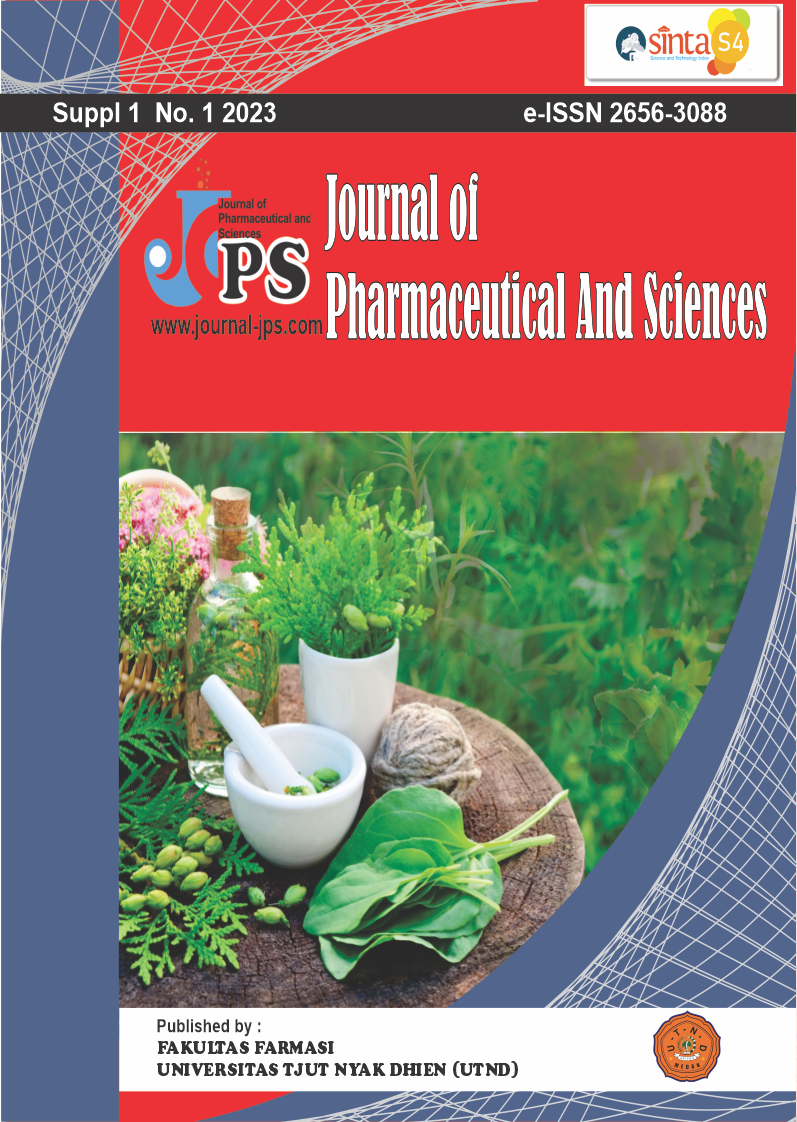Analisis literasi kesehatan pasien diabetes melitus tipe 2 dengan terapi oral antidiabetes di puskesmas Surabaya
Isi Artikel Utama
Page: 456-460
Abstrak
Pendahuluan DM merupakan penyakit kronik yang membutuhkan terapi jangka panjang. Kadar glukosa yang tidak terkontrol dapat mengakibatkan terjadinya komplikasi mikro dan makrovaskular serta kegagalan terapi.Kepatuhan minum obat merupakan faktor yang mempengaruhi keberhasilan terapi DM. Tujuan untuk memahami kepatuhan penggunaan OAD. Metode dalam studi penelitian ini adalah kuantitatif dengan desain non-eksperimental secara cross sectional. Sampel seluruh pasien PRB yang menderita DM tipe 2 yang menggunakan terapi OAD di Puskesmas Surabaya yang memenuhi kriteria inklusi dan eksklusi. Hasil Kesimpulan Tingkat literasi kesehatan Pasien Program Rujuk Balik Diabetes Melitus tipe 2 yang endapatkan terapi Oral Anti Diabetes di Puskesmas Surabaya dalam penelitian ini adalah 45% dengan literasi kesehatan tinggi dan 55% dengan literasi kesehatan rendah dengan presentase 55%. Dengan domain sikap pasien terhadap kesehatan (72,50%), pemahaman pasien terhadap informasi kesehatan (57,50%), dukungan sosial (22,50%), pertimbangan sosial ekonomi (75,00%), mengakses pelayanan kesehatan (92,50%), komunikasi dengan tenaga kesehatan (77,50%), pro-aktif (17,50%), dan menggunakan informasi kesehatan (80,00%)
Unduhan
Rincian Artikel

Artikel ini berlisensiCreative Commons Attribution-NonCommercial-ShareAlike 4.0 International License.
Referensi
Ada. (2017). Standards of Medical Care in Diabetes-2017: Summary of Revisions. Diabetes Care, 40(Suppl 1), S4–S5. https://doi.org/10.2337/dc17-S003
Aikens, J. E., & Piette, J. D. (2009). Diabetic patients’ medication underuse, illness outcomes, and beliefs about antihyperglycemic and antihypertensive treatments. Diabetes Care, 32(1), 19–24. https://doi.org/10.2337/dc08-1533
Alqarni, A. M., Alrahbeni, T., Qarni, A. Al, & Qarni, H. M. Al. (2019). Adherence to diabetes medication among diabetic patients in the Bisha governorate of Saudi Arabia - a cross-sectional survey. Patient Preference and Adherence, 13, 63–71. https://doi.org/10.2147/PPA.S176355
American Diabetes Association. (2023). Diabetes Care, S281–S282. https://doi.org/10.2337/dc23-SDIS
Berkman, N. D., Davis, T. C., & McCormack, L. (2010). health literacy: What Is It? Journal of Health Communication, 15(sup2), 9–19. https://doi.org/10.1080/10810730.2010.499985
Chan, A. H. Y., Aspden, T., Brackley, K., Ashmore-Price, H., & Honey, M. (2020). What information do patients want about their medicines? An exploration of the perspectives of general medicine inpatients. BMC Health Services Research, 20(1), 1131. https://doi.org/10.1186/s12913-020-05911-1
du Pon, E., van Dooren, A., Kleefstra, N., & van Dulmen, S. (2020). Effects of a Proactive Interdisciplinary Self-Management Program on Patient Self-Efficacy and Participation During Practice Nurse Consultations: A Randomized Controlled Trial in Type 2 Diabetes. Journal of Clinical Medicine Research, 12(2), 79–89. https://doi.org/10.14740/jocmr3965
Hewitt, J., Smeeth, L., Chaturvedi, N., Bulpitt, C. J., & Fletcher, A. E. (2011). Self management and patient understanding of diabetes in the older person. Diabetic Medicine : A Journal of the British Diabetic Association, 28(1), 117–122. https://doi.org/10.1111/j.1464-5491.2010.03142.x
Kesehatan, L., Diabetes, P., Tipe, M., Febriani, D. H., Tinggi, S., Kesehatan, I., Rapih, P., & No, J. T. (2020). health literacy PADA PASIEN DIABETES MELLITUS TIPE 2 health literacy AMONG PATIENTS WITH TYPE 2 DIABETES MELLITUS. Media Ilmu Kesehatan, 9(2).
Moeini, B., Haji Maghsodi, S., Kangavari, M., Afshari, M., & Zavar Chahar Tagh, J. (2016). Factors associated with health literacy and self-care behaviors among Iranian diabetic patients: A cross-sectional study. Journal of Communication in Healthcare, 9(4), 279–287. https://doi.org/10.1080/17538068.2016.1217968
Lovic, D., Piperidou, A., Zografou, I., Grassos, H., Pittaras, A., & Manolis, A. (2020). The Growing Epidemic of Diabetes Mellitus. Current Vascular Pharmacology, 18(2), 104–109. https://doi.org/10.2174/1570161117666190405165911
Osborn, C. Y., Cavanaugh, K., Wallston, K. A., Kripalani, S., Elasy, T. A., Rothman, R. L., & White, R. O. (2011). health literacy Explains Racial Disparities in Diabetes Medication Adherence. Journal of Health Communication, 16(sup3), 268–278. https://doi.org/10.1080/10810730.2011.604388
Rad, G. S., Bakht, L. A., Feizi, A., & Mohebi, S. (2013). Importance of social support in diabetes care. Journal of Education and Health Promotion, 2, 62. https://doi.org/10.4103/2277-9531.120864
Reisi, M., Mostafavi, F., Javadzade, H., Mahaki, B., Tavassoli, E., & Sharifirad, G. (2016). Impact of health literacy, Self-efficacy, and Outcome Expectations on Adherence to Self-care Behaviors in Iranians with Type 2 Diabetes. Oman Medical Journal, 31(1), 52–59. https://doi.org/10.5001/omj.2016.10
Saibi, Y., Romadhon, R., & Nasir, N. M. (2020). Kepatuhan Terhadap Pengobatan Pasien Diabetes Melitus Tipe 2 di Puskesmas Jakarta Timur. Jurnal Farmasi Galenika (Galenika Journal of Pharmacy) (e-Journal), 6(1), 94–103. https://doi.org/10.22487/j24428744.2020.v6.i1.15002
Sattar, N. (2013). Gender aspects in type 2 diabetes mellitus and cardiometabolic risk. Best Practice & Research Clinical Endocrinology & Metabolism, 27(4), 501–507. https://doi.org/10.1016/j.beem.2013.05.006
Wu, Y., Ding, Y., Tanaka, Y., & Zhang, W. (2014). Risk factors contributing to type 2 diabetes and recent advances in the treatment and prevention. International Journal of Medical Sciences, 11(11), 1185–1200. https://doi.org/10.7150/ijms.10001





